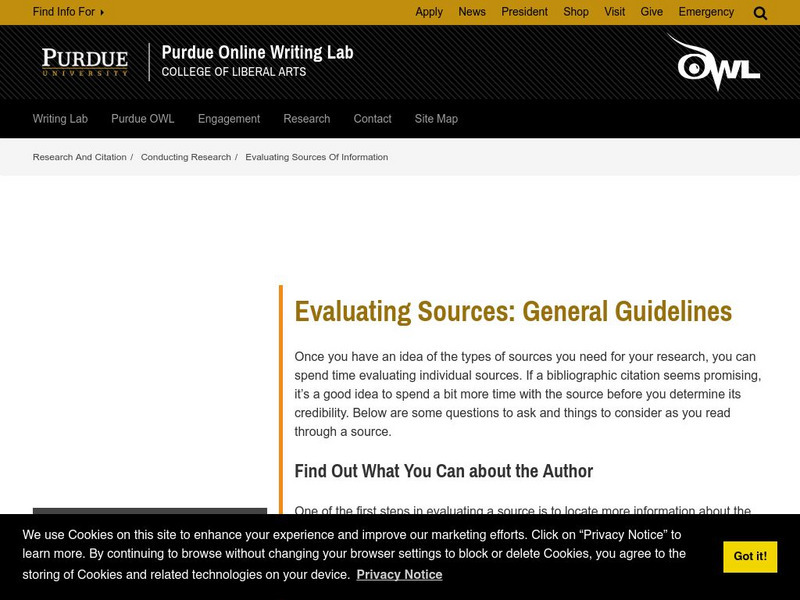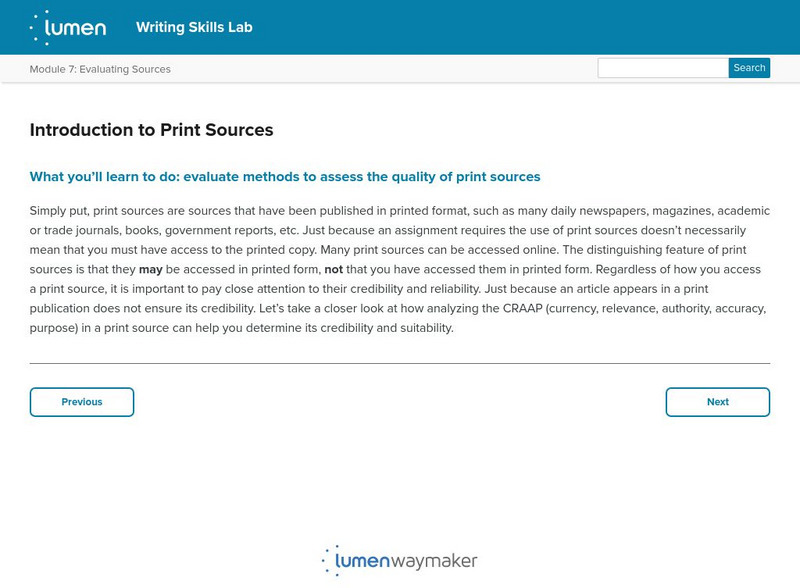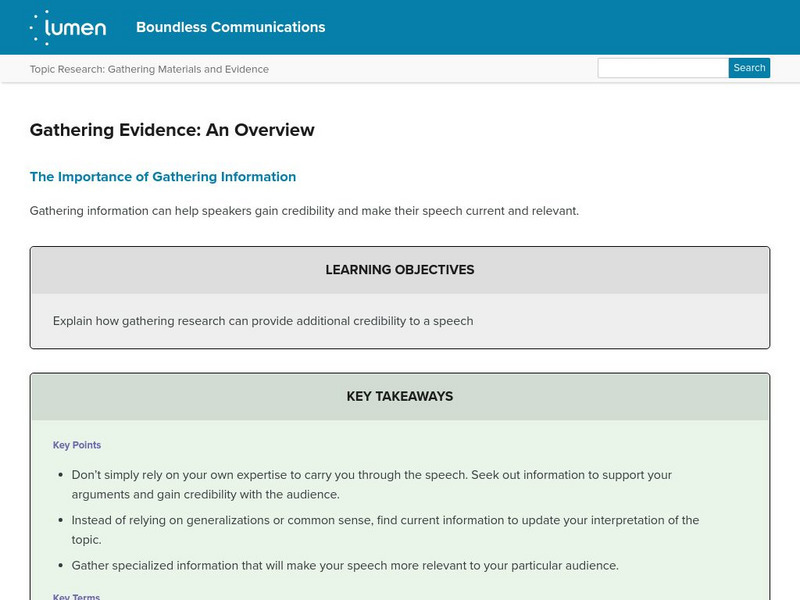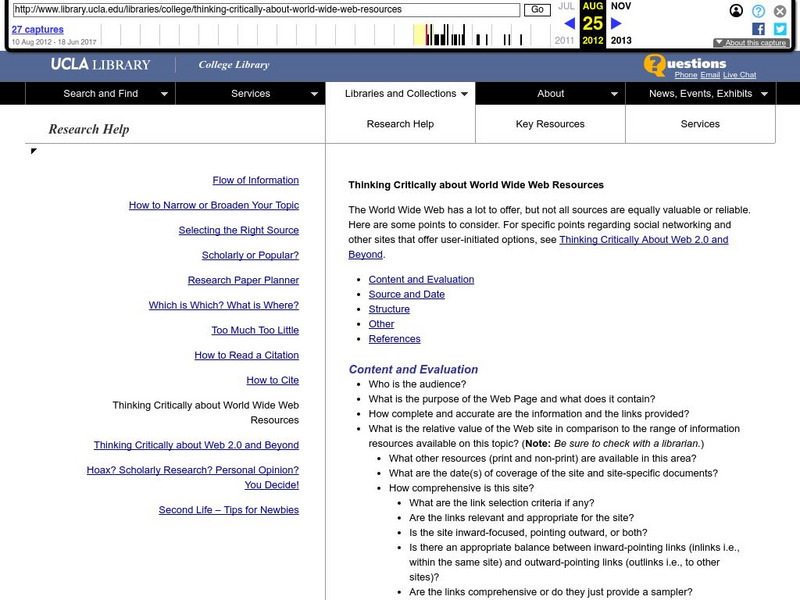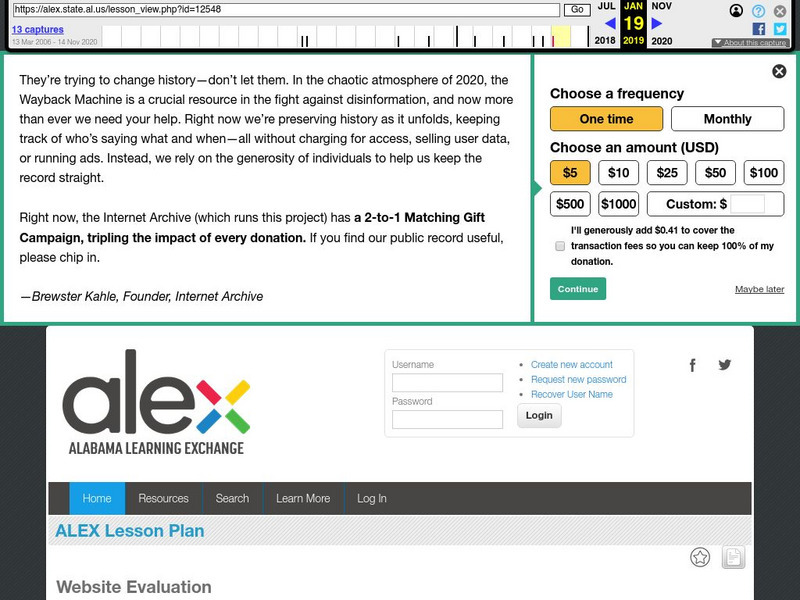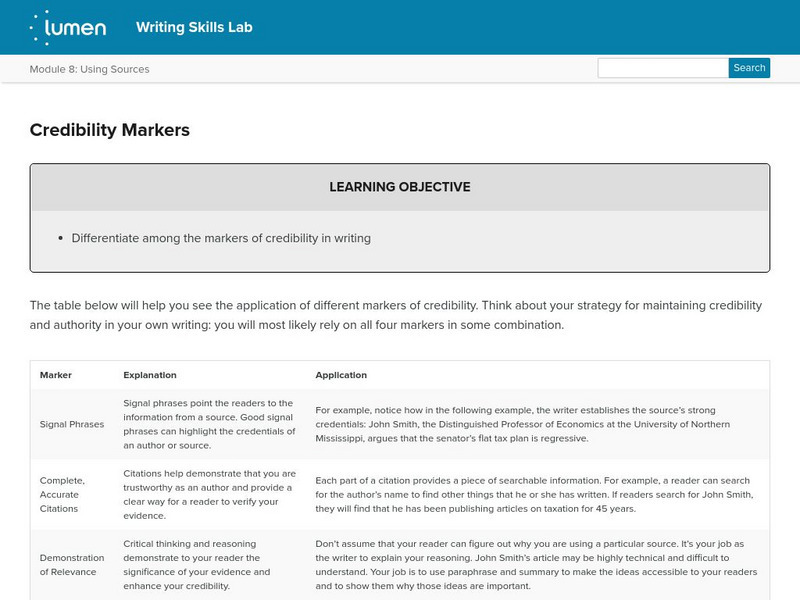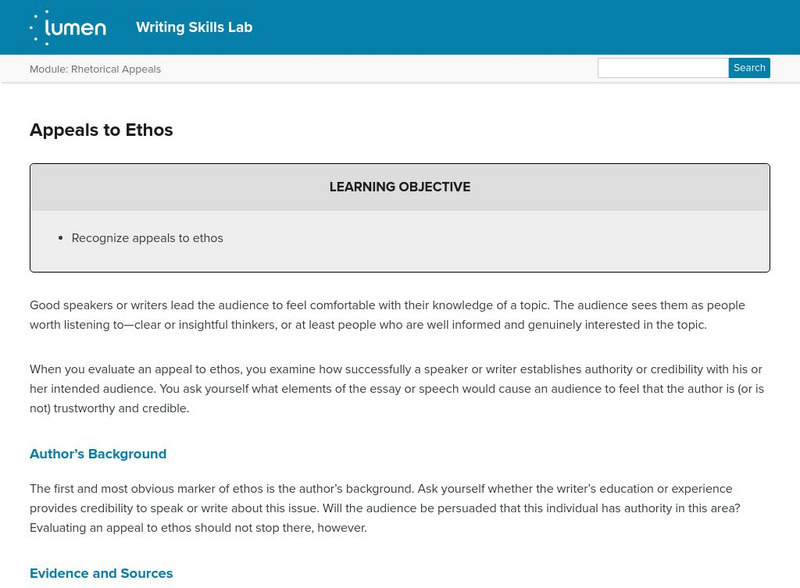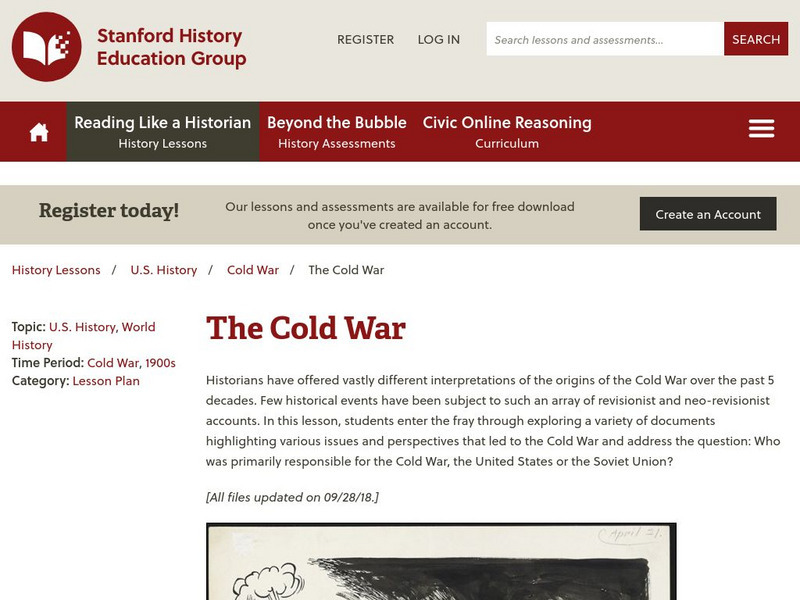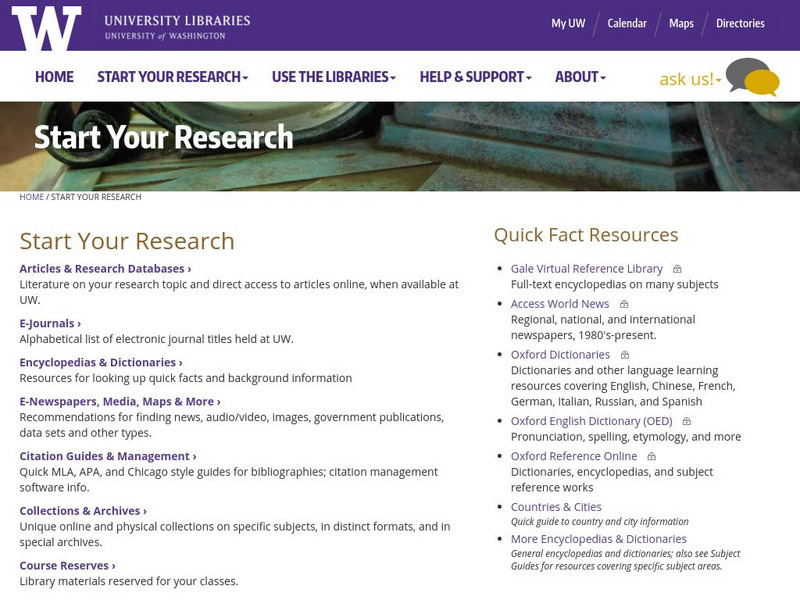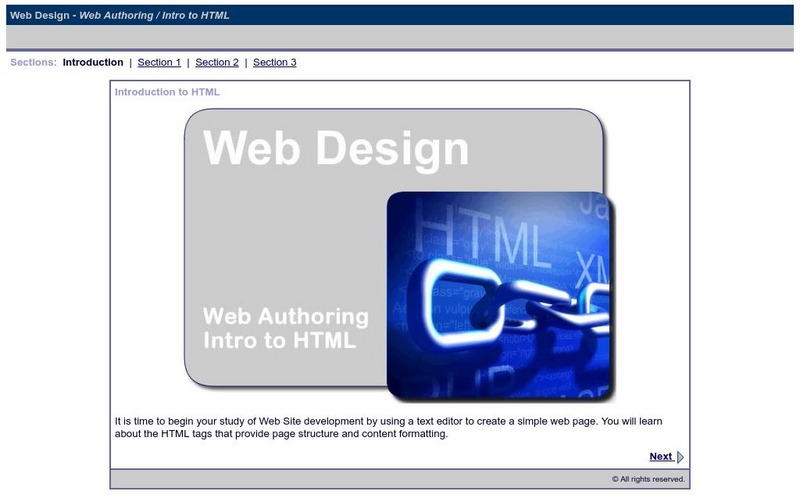Hi, what do you want to do?
College Board
Evaluating Sources: How Credible Are They?
How can learners evaluate research sources for authority, accuracy, and credibility? By completing readings, discussions, and graphic organizers, scholars learn how to properly evaluate sources to find credible information. Additionally,...
Arizona State University
Arizona State U.: Research Success for High School Students: Evaluating Sources
A collection of resources for evaluating sources. Topics covered include knowing your sources, assessing whether a source is scholarly, the CRAAP Test (includes chart, worksheet, and website evaluation sheet), and how to identify fake news.
Online Writing Lab at Purdue University
Purdue University Owl: Evaluating Sources: General Guidelines
This entry focuses on evaluating your sources while reading them, giving suggestions on what to look for when reading.
Lumen Learning
Lumen: Evaluating Sources: Craap Analysis of Multimedia Sources
This lesson focuses on evaluating multimedia sources using the CRAAP Analysis: Currency, relevance, authority, accuracy, and purpose. Click on the NEXT button on the bottom right for more information. SL.11-12.2 Eval&Integrate sources
Lumen Learning
Lumen: Evaluating Sources: Introduction to Online Sources
This is an introduction to evaluate methods to assess the quality of online sources. Click the next button on the right bottom.
Other
Santa Rosa Library: How to Evaluate Information Resources
Tips and information about how to evaluate resources, both print and electronic. Includes information about source authority, purpose, objectivity, currency, completeness, and relevance. It includes a printable handout (top right)with...
Lumen Learning
Lumen: Evaluating Sources: Introduction to Print Sources
This is an introduction to evaluate methods to assess the quality of print sources such as daily newspapers, magazines, academic or trade journals, books, government reports, etc.
Lumen Learning
Lumen: Boundless Communications: Gathering Evidence: An Overview
This lesson focuses on the importance of gathering information that provides evidence for your topic that is credible, current, and relevant. It also discusses how to find and evaluate sources. SL.9-10.1a Prepared/Discuss
Lumen Learning
Lumen: Using Sources: Bringing Sources Into the Conversation
This instructional activity focuses on identifying the five components of the "source sandwich:" transition and introduction; a signal phrase; quotation, paraphrase, or summary; citation, and explanation of material's relevance. A...
Library of Congress
Loc: Teachers: Personal Stories and Primary Sources
Students will explore the value of personal stories and first-hand accounts when exploring history, in this case, the events of the early twentieth century, which included World War I and the Great Depression. Through this five-unit...
University of California
Ucla College Library: Thinking Critically About World Wide Web Resources
This site teaches readers how to evaluate the content and quality of web resources, offering questions and checklists to consider.
Alabama Learning Exchange
Alex: Website Evaluation
Utilizing a graphic organizer, students work individually and in groups to rank websites according to specific criteria.
Lumen Learning
Lumen: Using Sources: Credibility Markers
This lesson plan focuses on strategies for maintaining credibility and authority in your writing. It also provides a table of different types of credibility markers, an explanation, and the application for each. SL.9-10.2 eval &...
Kidsource OnLine
Kid Source on Line: Portfolio Use: Developmentally Appropriate Asssessment
Descriptions of the various forms of assessment that can involve students in their own assessments are given here. Presents the criteria for what items can be included in a portfolio and how to use it in evaluation.
Virginia Tech
Digital History Reader: Introduction
An online learning module for the U.S. and European history. Presents central questions of key events in history. Students explore data, evaluate conflicting accounts or interpretations, and develop conclusions based on primary evidence....
NPR: National Public Radio
Npr: Five Ways Teachers Are Fighting Fake News
Since a recent Stanford study showed that students at practically all grade levels can't determine fake news from the real stuff, the push to teach media literacy has gained new momentum. This article gives five quality examples of...
Stanford University
Sheg: Document Based History: Reading Like a Historian: Civil Rights Act of 1964
[Free Registration/Login Required] JFK was known for being supportive of the Civil Rights Movement. In this instructional activity, students will review two speeches and evaluate the devotion the President had to civil rights.
PBS
Pbs Learning Media: Common Sense Education: Identifying High Quality Sites
Learn how to "test before you trust" the sites and information found on the Web in this lesson plan and student handout from Common Sense Education. Assessing what you find on the Web is an essential skill for today's middle schoolers....
Lumen Learning
Lumen: Rhetorical Appeals: Appeals to Ethos
This lesson focuses on appeals to Ethos, When you evaluate an appeal to ethos, how successfully a speaker or writer establishes authority or credibility with his or her intended audience. You ask yourself what elements of the essay or...
Alabama Learning Exchange
Alex: Poetry Slam
Students will locate a poem of their choice from a designated website to interpret. Students will then search the Internet for performances of the poem they select. In addition to creating a written interpretation of the poem, including...
Stanford University
Stanford History Educaiton Group: Cold War
[Free Registration/Login Required] Lesson in which young scholars use primary source material to evaluate issues and perspectives surrounding the Cold War. Lesson plan, PowerPoint and original documents.
Scholastic
Scholastic: Adventures in Math: Lesson 1: Money Matters
The process of earning money is the cornerstone of financial literacy. In this lesson, learners will identify key terms associated with earning money, explore ideas for earning money now, and evaluate various career options as sources of...
Other
University of Washington Libraries: Starting Research
If you need help knowing where to start your research, or if you're a teacher looking for a way to help students understand the research process, this resource is terrific. Interactive tutorials on a number of topics offer review quizzes...
Department of Defense
Do Dea: Web Design: Module 2: Web Authoring / Intro to Html
In Module 2 of this course on web design, students learn how to begin creating a web page using a text editor, how to use tags and attributes, how to format text, and how to use lists. The last section covers accessibility issues and how...







